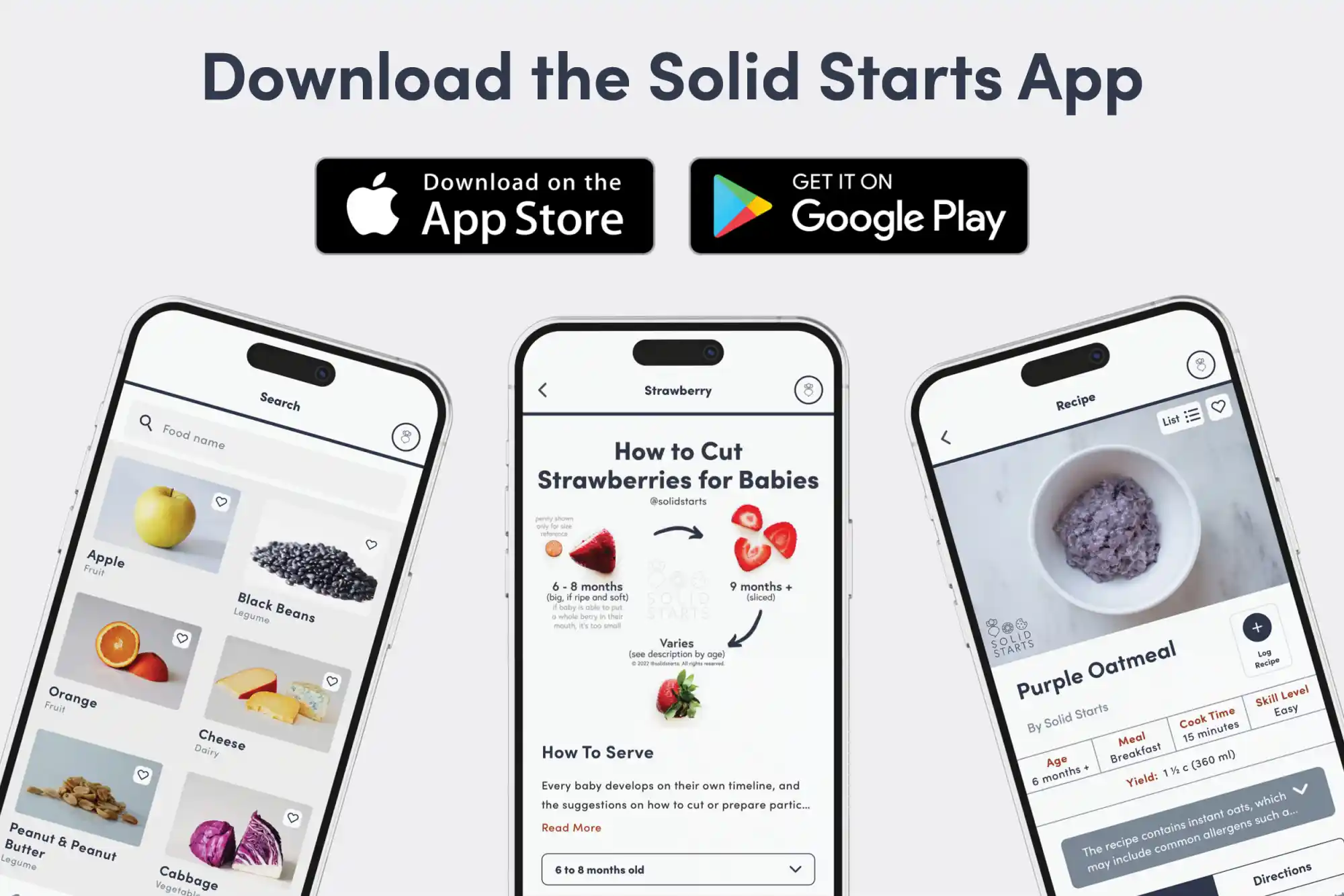Access our First Foods® Database in the Solid Starts App.
Learn moreHoney
Sweetener
Age Suggestion
12 months
Iron-Rich
No
Common Allergen
No

Warning
To be safe, avoid honey before the first birthday due the risk of infant botulism. Honey is associated with infant botulism, a rare but serious condition.
When can babies have honey?
After baby’s first birthday. Honey can contain spores from the Clostridium botulinum bacteria, which can increase the risk of infant botulism, a rare but potentially fatal illness. While honey is considered safe for toddlers, babies under 12 months of age are most at risk. If baby happens to taste food with honey, keep calm and know that it is probably fine. Symptoms can first present anywhere between 3-30 days after being exposed to botulinum spores, one of the first signs being constipation. If, at any point, baby appears weak and/or lethargic, contact the child's pediatrician.
Bees are an ancient family of insects, and some members of this family have long harvested nectar from flowers to create the sweet ingredient known as honey. It is believed that honey-producing bees originated in South Asia thousands of years ago, and today, these bees diligently transform nectar into honey in the wild and in beehives worldwide.
How do you serve honey to toddlers?
Every baby develops on their own timeline, and the suggestions on how to cut or prepare particular foods are generalizations for a broad audience.
6 to 11 months old:
Avoid due to the risk of infant botulism.
12 months old +:
Use honey in family meals as desired, including in baked goods, dressings, and sauces. Serve desserts and sweets containing honey in moderation, modifying as needed to reduce choking risk.
Videos
Is honey a choking hazard for babies?
No. Honey as an ingredient is not a common choking hazard, though candy and other food with honey certainly can be. To reduce the risk, wait to offer food with honey until after the first birthday and, when it’s time to serve honey, do so in an age-appropriate way as described in the How to Serve section. As always, make sure to create a safe eating environment and stay within reach of baby during meals.
Learn the signs of choking and more about choking first aid in our free guides, Infant Rescue and Toddler Rescue.
Is honey a common allergen?
No. Honey allergies are rare, though not unheard of. However, baked goods, desserts, and other food containing honey often contain common food allergens. It is important to introduce each common food allergen and rule out a food allergy before sharing prepared foods that contain multiple potential food allergens. This way, when you are ready to share a prepared food, you will be confident that baby has already eaten any common food allergens in it. This approach can also help you narrow the possibilities of which food is responsible if baby has an allergic reaction.
Although honey is often promoted as a home remedy for seasonal allergies, a study has demonstrated no difference in patients who ingested raw honey, commercially processed honey, or a honey-flavored placebo. In rare cases, honey may actually increase allergy symptoms in individuals with pollen or bee venom allergies when eaten or applied to the skin.
As you would when introducing any new food, start by offering a small quantity for the first few servings. If there is no adverse reaction, gradually increase the quantity over future meals.
Does cooking honey make it safe for babies?
Generally, no. The spores that cause infant botulism are resistant to heat. Typical cooking or baking at home does not eliminate the spores. Since processing methods vary, it is also recommended that store-bought foods containing honey be avoided for babies under 12 months of age, including baked goods, breads, cereals, and other products.
My baby ate food with honey in it. What should I do?
First, take a deep breath, and know that the risk of illness is extremely low. Infant botulism is uncommon; for instance, infant botulism affects about 160 infants in the United States each year, and the majority of these cases are not due to honey.
If baby ingests food with honey, stop offering the food and watch for symptoms over time. Symptoms can take anywhere from 3 to 30 days to appear and can range from mild to severe. These symptoms include: constipation, a weak cry, a weak suck (and thus slowed bottle feeds or nursing sessions), inability to make facial expressions, a weak gag reflex, and overall loss of muscle tone so that baby appears floppy, with an inability to hold their head up. If you are worried that your infant has botulism, take them to a physician right away.
Can toddlers eat honeycomb?
Yes, but in moderation and with some caution. Those who have pollen allergies may have allergic reactions to honeycomb. Additionally, in some cases, beeswax, propolis, and/or royal jelly, which are present in varying amounts in honeycomb, can also cause allergic reactions that have ranged from mild to severe.
The chewy component of honeycomb that is mainly made of beeswax may have beneficial health properties such as supporting liver and heart health, but consistently eating large amounts of honeycomb can be associated with stomach blockages, so avoid offering in large amounts. Because of this waxy consistency, honeycomb can become gummy in the mouth and can be a choking hazard. Cutting the honey into smaller pieces and making sure the toddler fully chews and swallows the honeycomb before moving onto the next bite can help reduce this risk. Lastly, honey is rich in sugars, and it is best to limit sugar intake for toddlers, children, and adults alike. Bottom line: If you are positive there is no allergy and the child is 12 months or older, a little honeycomb prepared in an age-appropriate way is okay.
How do I give my toddler honey for a cough?
If you would like to give honey as a cough remedy to a child 12 months or older, stir a spoonful of honey into a warm drink like water or herbal tea to help soothe the child's throat.
Our Team
Written by
Expert Tips Delivered to Your Inbox
Sign up for weekly tips, recipes and more!
Copyright © 2026 • Solid Starts Inc







